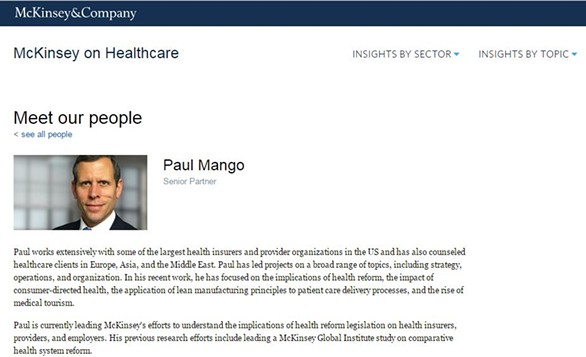
Image courtesy of McKinsey & Company
Republican gubernatorial candidate Paul Mango's McKinsey & Company profile page before it was removed this month
A now-removed bio from the McKinsey & Company website described Mango as focusing on “the implications of health reform, the impact of consumer-directed health, the application of lean manufacturing principles to patient care delivery processes, and the rise of medical tourism.”
However, Mango has yet to publicly announce his opinions of the GOP’s Affordable Care Act repeal effort, the American Health Care Act (AHCA). When Mango officially announced his campaign at Soldiers & Sailors Memorial Hall on May 17, the Pittsburgh Post-Gazette reported Mango “sketched out few concrete policy proposals” on health care, but “was hustled out by campaign staff before reporters could ask questions.”
This silence comes at a time when Pennsylvanians consider health care the fifth most important issue facing the state, according to a May Franklin & Marshall College poll, and as residents across the commonwealth have protested congressional Republicans over health-care issues.
Even more perplexing is that Mango appears to have been working on understanding AHCA’s effect on the country before he announced his run for governor. The now-deleted McKinsey & Company bio stated that Mango was “leading McKinsey's efforts to understand the implications of health reform legislation on health insurers, providers, and employers.”
And a document leaked from McKinsey in February, during the first effort to pass AHCA, reported that AHCA could cause a 30 percent drop in health-insurance coverage; additionally, 38 percent of currently insured individuals might not be able to find affordable plans since AHCA would significantly cut Medicaid funding. The McKinsey report also predicts states would lose a large amount of federal funding, if AHCA becomes law.
Keep in mind that McKinsey had analyzed the first AHCA, not the one that passed the U.S. House this month. But the second ACHA is similar to the first, as the Congressional Budget Office score still estimates that it will cause 23 million Americans to lose coverage, just 1 million less than than bill's first draft.
Mango has not shared his opinions on AHCA on his campaign website; his website mostly insults the Affordable Care Act.
In February, he wrote an op-ed on Philly.com that showcased many similar proposals to AHCA. In it, Mango directs criticism toward Pennsylvania's choice to expand Medicaid (AHCA cuts Medicaid funding); he says people should “pay for lapsed periods of coverage” (same as AHCA); and he criticizes health care’s rising costs to the federal budget (AHCA reduces budget costs by $119 billion, according to the CBO score).
The Mango campaign didn't return a request for comment on this story.
But Pennsylvania state Rep. Dan Frankel (D-Squirrel Hill) still wants to know exactly where Mango stands on AHCA. In a May 11 conference call, Frankel said, “We see Republican governors stand up to AHCA and say 'do not do this,'” citing that Republican governors like John Kasich, of Ohio, and Rick Snyder, of Michigan, have come out against AHCA. “It’s only reasonable to ask those Republicans that are running for governor here to say where they stand on health care,” he added.
Furthermore, Frankel cites the benefits the ACA has brought to area health-care providers like Allegheny Health Network and University of Pittsburgh Medical Center, who have seen growth thanks in part to more people on health insurance. With these benefits in mind, Frankel asks Mango to not only share his thoughts on health care, but to support the ACA.
“I demand that [Mango] takes a position on this bill,” said Frankel of AHCA. “And I ask him to stand by [the ACA].”

